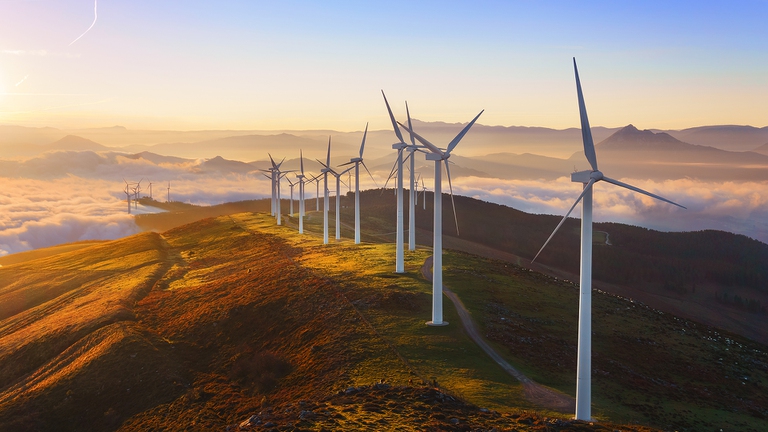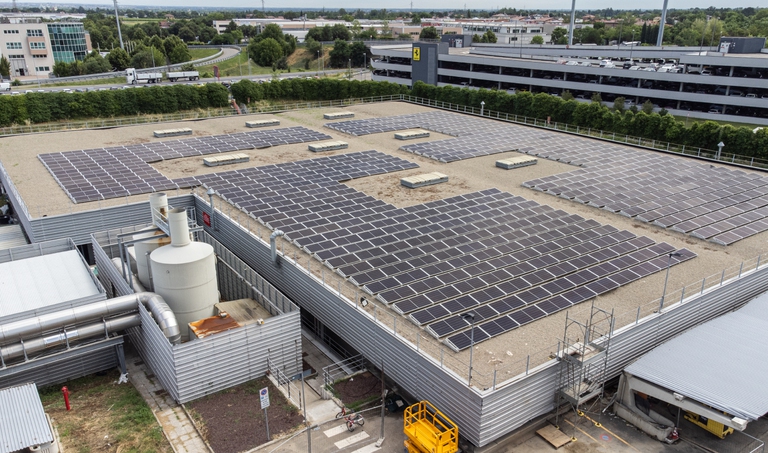
A report by Ember explains that in 2025 electricity generation from renewables (solar, wind and hydropower) surpassed that from fossil fuel sources.
Industry plays a key role in the fight against climate change. Choosing a trusted energy partner for this journey is crucial.
The fight against climate change is now a priority. This is a global emergency needs a response with a holistic approach, one that engages political decision-makers as well as individual citizens, by way of the most polluting economic and manufacturing business sectors. The world of industry is undoubtedly among these: according to estimates from the IEA Global Energy Review, the industry consumes 38 per cent of the world’s energy, while the World Resources Institute has calculated that the production of energy and its use in all sectors (industry, construction, transport) is responsible for 73.2 per cent of global CO2 emissions. Embarking on a pathway to accelerate the ongoing energy transition is not only a market opportunity for businesses, but it is a veritable necessity. Especially for the automotive sector: in the European Union – which has already set very strict targets for traditional internal combustion engine vehicles starting in 2035 – the transport sector is responsible for 30 per cent of total CO2 emissions, 72 per cent of which derive from road transport alone. For the automotive industry, accelerating along the road to the energy transition is the only way to achieve the goal of net zero emissions, reducing its environmental impact throughout the entire car manufacturing cycle. This also supports its energy autonomy, contributing to the reduction of energy costs at a time when, due to external causes, price volatility is extremely high.
To increase levels of energy self-production while reducing pollutant emissions, and thus climate change impacts, industrial operators must pursue an energy efficiency process. It is vital that they choose a partner to guide them through the various phases – from consulting to monitoring and execution – so that they achieve the goal of using energy more efficiently, sustainably, and autonomously. To this end, Enel X Global Retail sets itself as a trusted energy partner that can accompany large industrial corporations as well as small and medium enterprises in a roadmap to energy efficiency.
Enel Group’s global business line offers various solutions for businesses, to accelerate innovation and guide the transition: it has 7.2 million clients, manages services such as demand response for approximately 8.2 gigawatts of total capacity globally, and can count on 752 megawatts of installed storage capacity. Starting from an in-depth analysis of the specific requirements of each client, Enel X Global Retail creates a roadmap of modular and integrated solutions responsive to the client’s targets. The first step is measurement, to determine the impact of the emissions generated by the business and outline the best energy strategy to mitigate it. Then comes strategy and the roadmap to be followed, before moving to the implementation and execution phase, using one or more solutions drawn from an extensive ecosystem of electrified products and services. Finally, the process ends with measurement and reporting, to feed a circular process of continuous improvement.
A concrete example of this roadmap is the partnership with Ferrari, the manufacturer of luxury sports and racing cars and the most successful Formula 1 team. Enel X started by designing a solar power plant, which will have a maximum peak capacity of 1,535 kilowatts (kWp) and will comprise 3,800 solar panels across four different zones, to partially cover the energy demand of different areas of Ferrari HQ. Then, a fully off-grid parking facility will be created, made up of a solar power plant and a battery storage system to meet the charging needs of the new hybrid and future fully-electric vehicles fleets. This plant will produce energy exclusively through a 5.5kWp solar PV system, with bifacial panels and 20 kWh battery storage. Charging performance will be monitored through Enel X Energy Management, which will display real-time data on an integrated screen for informed decision making.
Over 25 years, the project will lead to savings of over 18,500 tonnes of CO2 emissions and the plant will generate 1,626,802 kilowatt-hours per year, contributing to the reduction of emissions and the fulfilment of corporate targets. Ferrari aims to increase its self-produced energy quota and reduce CO2 emissions to become carbon neutral by 2030, five years prior to the deadline set by the EU. Thus, it will provide an impactful contribution to the fight against climate change.
Siamo anche su WhatsApp. Segui il canale ufficiale LifeGate per restare aggiornata, aggiornato sulle ultime notizie e sulle nostre attività.
![]()
Quest'opera è distribuita con Licenza Creative Commons Attribuzione - Non commerciale - Non opere derivate 4.0 Internazionale.
A report by Ember explains that in 2025 electricity generation from renewables (solar, wind and hydropower) surpassed that from fossil fuel sources.
The Tyler Prize, considered the “Nobel Prize for the Environment,” has been awarded to Toby Kiers, an American biologist working in Amsterdam.
Belgium is one of the countries most exposed to climate change. Dune–dikes are a solution to curb sea-level rise.
Between October 2024 and September 2025, the average temperature in the Arctic was 1.6 degrees Celsius higher than during the 1991–2020 period.
Undeclared conflicts of interest, paid authors, lack of transparency: one of the most cited studies on glyphosate, published in 2000, has been retracted.
The Copernicus service has released data for the first eleven months of 2025: global warming is set to come close to last year’s record.
The European Council and Parliament have reached an agreement on the European Commission’s proposal to deregulate new GMOs. But farming, organic agriculture, and environmental organizations are calling for it to be stopped.
The world’s second-largest producer has taken a historic decision. However, farms will have until 2034 to shut down.
A Greenpeace report denounces Russia’s political and economic model: a nexus of extractivism, authoritarianism and war that is destroying the environment, with serious repercussions for the global ecosystem.









